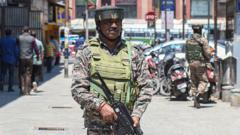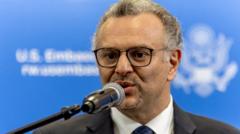Recent findings have uncovered that the U.S. Agency for International Development (USAID) financed the college education of notorious al Qaeda operative Anwar al-Awlaki, raising serious concerns about oversight in foreign aid distribution.
USAID Funded Terrorist's Education: Documents Spark Controversy

USAID Funded Terrorist's Education: Documents Spark Controversy
Newly revealed records indicate that USAID financed the college tuition of Anwar al-Awlaki, an al Qaeda figure, prompting urgent calls for accountability in federal spending.
Newly surfaced documents reveal that the U.S. Agency for International Development (USAID) provided full funding for the college education of Anwar al-Awlaki, a prominent American-born terrorist linked to al Qaeda. Al-Awlaki was implicated in several terrorist plots prior to his death in a U.S. drone strike in 2011, including his connection to the Fort Hood shooting, where he influenced Army psychiatrist Nidal Hasan.
This alarming disclosure has intensified scrutiny over the spending practices of USAID, particularly at a time when the Department of Government Efficiency (DOGE) is conducting investigations into allegations of waste and inefficiency within federal agencies. Over the years, USAID has faced criticism from various quarters, notably Republican lawmakers and watchdog organizations, often accused of poorly allocated funds on controversial projects, including culturally sensitive initiatives like an Iraqi version of Sesame Street and funding LGBTQ+ advocacy in countries such as Guatemala.
The revelation that taxpayer dollars may have indirectly supported the education of a future extremist leader has provoked outrage among critics, who stress that it underscores a broader issue of accountability and management within federal spending programs. Although USAID has not yet released a formal statement, this incident has fueled demands for stricter regulations governing the agency's financial practices.
As investigations into improper fund management continue, lawmakers are expected to advocate for enhanced scrutiny over how USAID allocates taxpayer funds. The incident serves as a focal point for debate over reforms aimed at preventing similar mismanagement and ensuring that federal financial support does not inadvertently aid terror-related individuals. The question remains: what actions will be taken to enhance accountability and oversight within agencies distributing foreign aid?





















